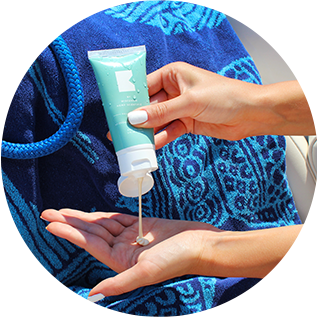
Guide to Sunscreens
Reviewed by Dr. Kate Shuster, board-certified dermatologist at Galen Dermatology
You need to protect yourself from the sun 365 days a year—even on cloudy days! The sun’s harmful UV rays can penetrate through clouds, making it crucial to safeguard your skin every day. Consistent use of sunscreen is one of the most effective ways to protect your skin, reducing the risk of skin cancer, and preventing early skin aging caused by sun exposure.
Choosing the right sunscreen is essential for optimal protection. With a variety of options available, it can be challenging to determine which one is best for you. This guide will help you understand the key factors to consider when selecting a sunscreen to ensure you make an informed choice for you and your family.
Selecting Sunscreen
- Broad Spectrum – Sunscreens with this label protect the skin from UVA and UVB rays, both of which can cause skin cancer.
- SPF – Make sure your sunscreen has an SPF, or Sun Protection Factor, of 30+ which filters out about 97% of UV rays. Higher SPF does give more protection, but the higher you go, the difference in protection becomes smaller. No sunscreen protects you completely.
- Water Resistant – Remember, water-resistant does not equal waterproof. Therefore, you must re-apply at least every 2 hours or more often if you are swimming or sweating.
- Physical v. Chemical – There are pros and cons of both physical and chemical sunscreens. It is important to know the difference so you can decide what is best for you and your family.
- Physical sunscreens, also called sunblocks, sit on your skin like a shield deflecting the sun’s rays. They use mineral-based ingredients such as zinc oxide and titanium dioxide to block UV rays. They do come off easily, so more frequent application is required. If you have sensitive skin, opt for physical sunscreen which is safe for use on babies, during pregnancy, and if you are prone to heat-activated skin conditions like rosacea.
- Chemical sunscreen, on the other hand, is more like a sponge and absorbs the sun’s rays to change them into heat which is then released from the skin. Chemical sunscreen is thinner and therefore easier to rub into your skin. However, it is more likely to irritate skin, clog pores, and increase breakouts on acne-prone skin.
Applying Sunscreen
- Everyone should be applying sunscreen. Even though melanin in the skin can absorb some UV rays before causing damage, it will not prevent all damage or limit exposure.
- Check the expiration date before applying. Do not use sunscreen that is older than 2 years after it was manufactured.
- Apply sunscreen every day – even on cloudy days!
- Most adults need about 1 ounce or 2 tablespoons of sunscreen to fully cover their body. Thin, light-weight, and light-colored fabrics are more likely to allow sunlight to filter through to your skin. Make sure to apply sunscreen to areas where your skin may be exposed. Do not forget your feet, neck, and ears!
- Re-apply at least every 2 hours and more often if you are swimming or sweating.
Looking for safe, recommended sunscreen products? Use the Skin Cancer Foundation’s sun protection product finder: https://www.skincancer.org/recommended-products/
At Galen Dermatology, we recommend and sell EltaMD sunscreen products. This brand offers a variety of sunscreens formulated for all skin types and lifestyles. Call us at (423) 954-9017 for more information or come by to get your sunscreen and start protecting your skin today!
